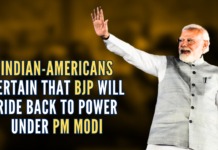
SF Chronicle relies on outlandish claims and poorly backed research
A recent article discussing “caste” at UC Davis argues – “caste” is rooted in Hindu scriptures (with an incendiary implication that it spread in other religions thanks to Hinduism) and thus this social evil is really to be blamed upon Hinduism and Hindus[1]. The crux of this assertion rests on unproven allegations against individuals (some of which have been pending in US courts for well over a year), as “proof” against an entire community. There is also exclusive reliance on data from sources that have a history of bigotry against Hindus, while occasionally peppering the argument that “caste” is present among all the groups in South Asia. The sole aim appears to be to caricature and vilify Hindus as bigots.
The author, Shwanika Narayan, seems to rely on (improperly translated) verses such as one from the Rigveda to ascribe “caste hierarchy” in one of the most sacred Hindu texts. For example, while the particular verse talks about four social groups, there is no mention of any hierarchy, along with the fact that all four are parts of the same Supreme Being (Purusha). The fallacy of this argument is exposed further when one reads the verse immediately following – which describes how the moon emerged from His mind, the sun from His eyes, the deities Indra and Agni from His face, the wind from His breath, the cosmos from His belly button, the sky from His head, the earth from His feet and the directions from His ears.[2]
It would also be absurd to claim Hindus believe that the earth is inferior to the moon or that the cosmos is inferior to the sun or moon – yet that is what ensues if one applies the logic used in ascribing the concept of hierarchy to such philosophical concepts.
And finally, it is cherry-picking of the worst kind to isolate and present this one verse (where there is any discussion of a need for society to fulfill social roles per se) from over 10,000 others in the sacred text – a theme we see in the push to include “caste” as a protected category in the anti-discrimination policies at various universities.
Bias at SF Chronicle
Let us state upfront that Ms. Narayan is well aware that Dalit perspectives on “caste” in the US (and South Asia) are highly fragmented and contested. Yet, she refuses to acknowledge this, let alone make any attempt to report on it or include these differing viewpoints. In fact, in June of 2021, the same author spent 45 minutes in conversation with a senior CoHNA volunteer who identifies as a Dalit. He outlined the myriad ways he drew support and inspiration from Hinduism, its nurturing rituals and temples, and most importantly, his co-adherents of all backgrounds who have supported him through every stage of life. During that Zoom call and interview, Ms. Narayan, strangely enough, decided to keep her video turned off and then wrapped up the conversation by saying that she was “too busy” for another story on Dalit perspectives. Her recent one-sided article rehashing the same opinions throws light on why she was “too busy” to include the story of a young child who had fled physical abuse in his home and found succor and refuge in Hinduism. It did not fit the narrative being peddled by the elites and thus the silencing of a Dalit did not matter.
The Chronicle also relies on outlandish claims and poorly backed research. For example, the article quotes Equality Labs founder Thenmozhi Soundararajan, who states that “[this] structure of oppression affects hundreds of millions of South Asians today and over 5.4 million South Asian Americans in the U.S.,” even though there is no evidence to prove such claims in the U.S. There is also the conflation of racial privilege with “caste” privilege, thus ignoring the inherent prejudice against a largely POC minority. This also dismisses the diverse, lived experiences of South Asians – many of whom work grinding hours with minimal wage and low standards of living and also face racial discrimination[3][4]. To reduce this to a monolithic experience of privilege is extremely dishonest and shows the continued prejudice of the author and the Chronicle.
Not to mention, Equality Labs is known for its extremist and bigoted views on Hinduism and its denigration of Hindu festivals and deities, along with ties to radical groups.[5][6]
Just another Day of Hindu hate at UC Davis
It is important to recognize that social discrimination exists in various communities of South Asian descent, much like that among other communities from any part of the world.
What’s more insidious though, is the nature of Hinduphobia that is playing out at UC Davis. For example, some of the same students behind the resolution and the policy are also part of an official student body known as the other collective, which recently issued a blatantly xenophobic call to boycott Diwali, the most beloved Hindu festival that brings people from all walks of life together. It even depicted an extinguished diya (oil lamp), signifying death and inauspiciousness in the Hindu tradition[7]. The group declared that Hindu deities are “casteist” and that merely decorating Hindu homes, eating sweets, etc. is somehow “violent for Muslim, Dalit, Bahujan and Adivasi communities.” And in July 2021, the Indian Students Association at UC Davis created a post on Hindu persecution, only to be bullied, forced to take down the post and apologize[8].
After Holi its the turn of that most beloved of Hindu festivals, #Diwali to be targeted. No indigenous tradition can be left untouched it seems. UC Davis needs to #StopHinduphobia. https://t.co/A8M9525nQv
— CoHNA (Coalition of Hindus of North America) (@CoHNAOfficial) November 3, 2021
Laws based on faulty statistics and Hinduphobic sources
It is the ethical and moral responsibility of a lawmaker or administrator to do proper due diligence on both sides of a story when evaluating policies that impact lives. The UC Davis administration failed to do so and has instead relied on, among other things, information from a survey and presentation by Equality Labs. This came to light further in a recent article, where Danésha Nichols, the director of Harassment and Discrimination Assistance and Prevention Program at UC Davis, was connected to Equality Labs by the same activists and decided to add “caste” in the harassment policy – with no attempt to hear from both sides[9].
The Carnegie Endowment for International Peace, a well-reputed institution, exposed the problems with the Equality Labs survey. In its own 2021 survey of Indian Americans, Carnegie Endowment showed the Equality Labs survey to be skewed, and not representative of the South Asian population, and thus the “…precise extent and intensity [of “caste discrimination”] can be contested[10].
Furthermore, the Carnegie survey (Footnote 19 and 21) also deduced that “caste” does not rise as a significant factor within the Indian American community[11]. In addition, only five percent of respondents (of an already small self-selected sample) reported experiencing any such “caste” discrimination over the time period of the survey. Thus, it is clear that “caste” discrimination is not widespread and such categories have no relevance in the United States, in spite of a deliberate push by vested interests to show otherwise.
Another key point, the student resolution, which provided the impetus to pass the official UC Davis policy on “caste,” cites one source (Equality Labs) over 19 times – which alone should send alarm bells to any administrator truly concerned about academic integrity and rigor[12].
Passing laws based on faulty statistics and reliance on groups with a history of bigotry puts students and faculty members at risk in an already Hinduphobic environment on campus.
Thus, the Chronicle article on “caste” and UC Davis must be taken with a bag of salt.
Note:
1. Text in Blue points to additional data on the topic.
2. The views expressed here are those of the author and do not necessarily represent or reflect the views of PGurus.
References:
[1] UC Davis quietly added caste to its antidiscrimination policy. Will it cause others to do the same? – Nov 27, 2021, SF Chronical
[2] Purusha Suktam Word by word – Jan 24, 2017, Murpriya
[3] Low-wage South Asian workers in the U.S. hard hit by coronavirus business downturn – Mar 22, 2020, India Abroad
[4] Discrimination against Indian Americans happens more than you might think – Jun 10, 2021, WP
[5] BUSTING THE LIES OF EQUALITY LABS – Unravelling The Truth
[6] Why Do We Say No to Holi? A Guide To Challenge Casteism – Mar 02, 2020, Archive
[7] Hinduphobia is very much real in United States, so is great American ‘awokening’ – Nov 08, 2021, First Post
[8] Standing in Solidarity with the Hindu Community at UC Davis – Nov 12, 2021, Hindu on Campus
[9] Why are American colleges addressing caste discrimination? An ‘opportunity to educate’ – Nov 24, 2021, Yahoo Money
[10] Social Realities of Indian Americans: Results From the 2020 Indian American Attitudes Survey – Jun 09, 2021, Carnegie Endowment
[11] Breaking down the Carnegie Endowment’s 2020 Indian American Survey – Jun 15, 2021, PGurus.com
[12] REPURPOSING HATE AND HINDUPHOBIA – THE UC DAVIS “CASTE” RESOLUTION – CoHNA
PGurus is now on Telegram. Click here to join our channel and stay updated with all the latest news and views
For all the latest updates, download PGurus App.











Please read the various links I have cited in this post: https://www.quora.com/What-if-Constitution-of-India-is-replaced-by-Manusmriti-will-it-give-a-rigid-structure-to-Indian-society-and-enforce-cast-based-social-structure-so-that-knowledge-is-only-held-by-Brahmins-and-the-rest-of-people/answer/Suchindranath-Aiyer
[…] An article in Pgurus accuses the media of unfairly blaming Hinduism. It said the articles are based on sources with a history of a bias against Hindus. The article also accused UC Davis of Hinduphobia. […]